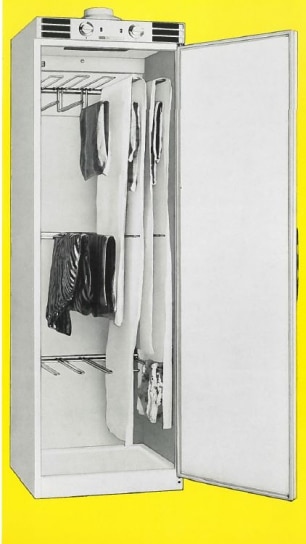Electrolux not only supplies domestic washing machines for family use – the company has a long tradition of supplying larger, sturdier machines to support the rise of communal laundry rooms, including the ‘tvättstuga’, still very much part of cultural life in Sweden today.
In 1944 Electrolux acquired Bohus Mekaniska Verkstad, an engineering company from Gothenburg who were pioneers in the production of large washing machines, giving Electrolux a foothold in the commercial laundry market. The opportunity quickly grew as during the Swedish building boom of the 1950s and 1960s, politicians were determined that every family should have access to affordable laundry facilities to help those who couldn’t afford their own automatic washing machine.
And so appeared the very Swedish ‘tvättstuga’ or ‘communal laundry room’ in new apartment blocks, with Electrolux supplying the Bohus commercial laundry product. The tvättstuga is a facility available at no extra charge to everyone living in an apartment block and is still part of family life across Sweden for many living in apartments today.

Bohus – an Electrolux commercial laundry product - was popular inside the Swedish tvättstuga
Swedish ‘Wascator’ proves popular in the U.S.
Swedish commercial laundry equipment was also influencing the future success of the communal coin laundry room on other side of the Atlantic. In the mid-1950s, a young engineer and laundry service expert Bernard Milch was called in to assess the damage to the Swedish vessel Stockholm and its on-board laundry service after its famed collision with the SS Andrea Doria outside Nantucket. This was his first introduction to the Swedish commercial washing machine known as the Wascator (bought by Electrolux in the 1970s) and he was very impressed by the effective simplicity of its front-loading design and saw great commercial potential.
At the same time, laundromats (a term first used by Westinghouse – owned by Electrolux today) were appearing all across the country in the 1950s. Milch, who had acquired the sales and marketing rights to the Wascator in North America, played on the words to launch the Wascomat – adding a coin meter to the Wascator – and the U.S. laundry industry was changed forever. Milch’s company, today named Laundrylux, to this day remains the main distributor of Electrolux professional laundry products in the U.S.

Drying cabinet WD100 was a part of Bohus Mekaniska Verkstads range during the 1950's
Helping businesses around the world
After Electrolux went on to acquire Wascator in 1973, the resulting company Electrolux Laundry Systems set its sights on becoming a prime provider to businesses around the world of commercial laundry services. Today Electrolux Professional continues to supply a wide variety of venues such as hotels, restaurants, cruise ships, prisons, nursing homes, fire stations and more with innovative, customer-centric solutions to help the everyday better.

